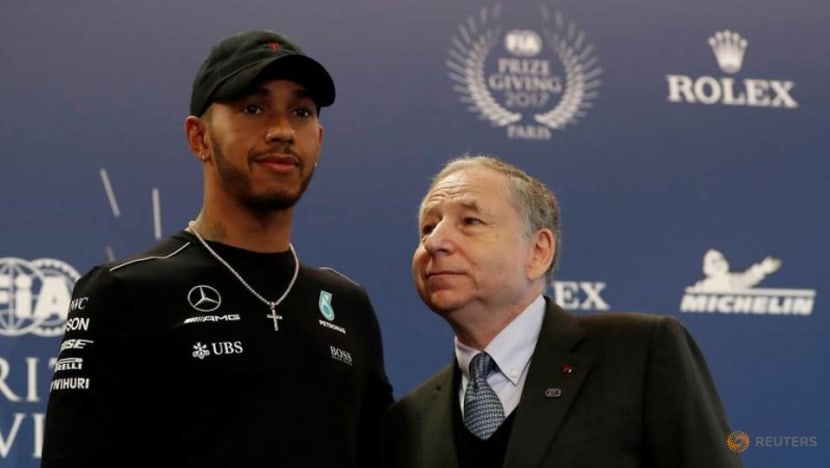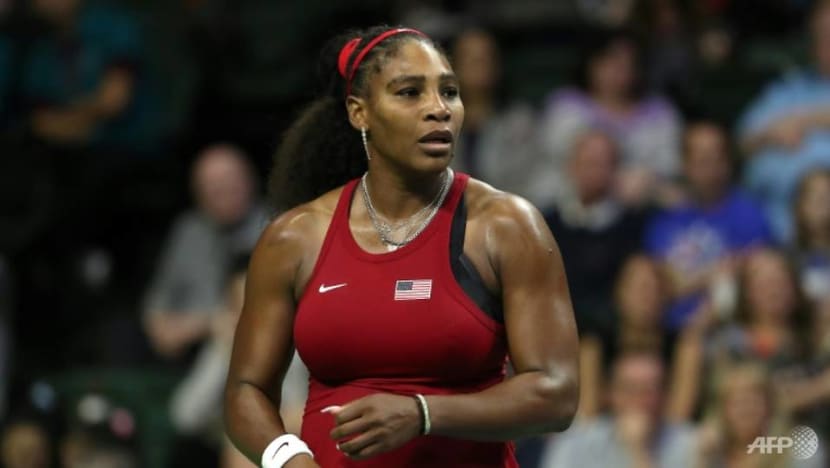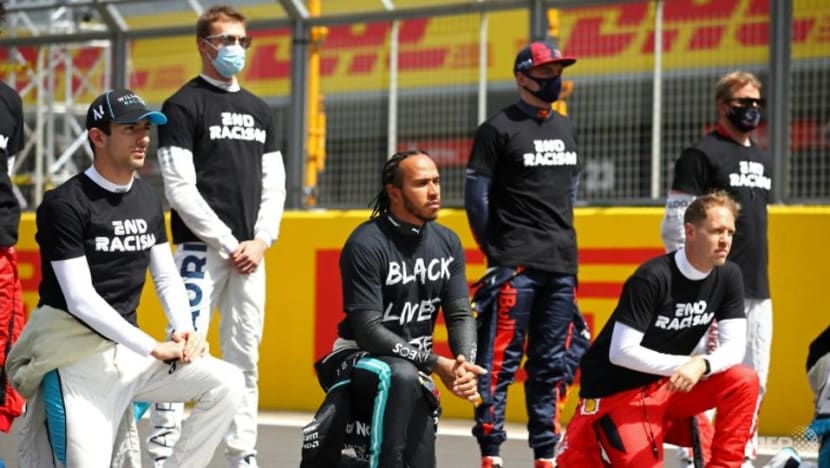commentary Commentary
Commentary: Lewis Hamilton has dominated F1. But the sport has also gained from his success
Having won five of the last six F1 titles, the British driver looks set for another championship having already won three of the four races this year, says John Duerden.

Mercedes' Formula One driver Lewis Hamilton (L) and Jean Todt, Federation Internationale de l'Automobile (FIA) President attend the FIA Champions news conference for FIA Prize Giving 2017 in Paris, France, on Dec 8, 2017. (Photo: REUTERS/Gonzalo Fuentes)
SINGAPORE: Formula One (F1) fans are happy that the season finally started in July after COVID-19 delayed the original start in March.
Some of that delight may be evaporating however as Lewis Hamilton looks set to dominate once again – unless of course if you are a fan of his. Hamilton has won five of the last six F1 titles.
Hamilton has already won three of the four races this year so far and was placed fourth in the other - though he actually finished second in the Austria Grand Prix only to receive a five-second penalty for contact with another car.
READ: Formula 1: Hamilton forcing rivals to 'count sheep' at Silverstone
That Hamilton is now 33 points clear of Mercedes team mate Valtteri Bottas would not be such a worrying prospect for the other drivers since they could catch up as winning any of the remaining races would be worth 25 points, while attaining second and third place would earn them 16 and 15 points respectively.
In a normal season of 21 races, there would have been more time to catch Hamilton.
Nothing about this year is normal though and the shortened F1 season is no exception as there are only nine races remaining. If Hamilton were to win three more, that could be enough for a fourth straight title.
After the British Grand Prix win on Aug 2, Max Verstappen, the third-placed Dutch rival of Hamilton, told reporters that the British star couldn’t be caught. He also said last November “It’s getting a bit boring seeing Lewis win.”
STARS HAVE TO MAKE WAY TOO
F1 is not the only predictable sport. Top level football offers few surprises as well.
Juventus have won the last nine Italian titles with Bayern Munich taking the previous eight in Germany. Of the big European competitions, only the English Premier League seems to offer some surprises with five winners in the past eight years but even there, the top six is full of familiar names.
READ: Commentary: The new era of English football belongs to Liverpool
In team sports however, the elite clubs can sign new stars and stay at the top for decades. Individual sports are different. The giants of tennis, golf, F1 and others have a limited time span at the top.
“Lewis Hamilton is in the midst of a fight he cannot win,” reported F1’s official site in March. “This is the generational battle so many great athletes face, the struggle to stay on top against the twin foes of age and the ever-improving rising stars.”
When that fight is over, Hamilton will be missed and not just for his success on the track, but also for taking the sport to unchartered territories off it.
Take other star athletes such as Serena Williams in tennis and golf’s Tiger Woods. They didn’t just set standards that others have to try to match up to but transcended their sport, taking it to new heights.
READ: Tiger adjusting to a new normal at spectator-free PGA Championship
Woods became the youngest ever player to win a major in 1997 and became an instant sensation. He attracted a new audience.
In those Masters tournaments he did not win until 2008, lesser US households, at 7.4 per cent, tuned in to watch over the four days compared to 9.5 per cent for the years he was triumphant.

As Woods started to dominate and attract outside interest, more money came into the sport. When he started on the tour in 1996, 15 players earned US$1 million, by 2007, that number had increased to 99. Lower down the rankings, winnings increased dramatically. The 130th ranked golfer in 2007 earned more than four times his 1996 predecessor.
“Tiger has been the instigator,” said golfer Phil Mickelson in 2014.
“…Because he’s brought increased ratings, increased sponsors, increased interest and we have all benefited…and we’re all appreciative. That’s why we miss him so much.”
MORE POPULAR THAN THEIR SPORT
Tennis great Serena Williams, who is still at the top of the women’s game, is another example.
A Sports Media Watch study during the 2018 US Open found that when she played, television ratings increased - not just for her game but for all that were played that day as people were cued onto their TV sets waiting for her to make her entry onto the court.
READ: Commentary: Don't expect football clubs to splash big bucks this transfer window
In June, United States Tennis Association CEO Mike Dowse was delighted as Williams announced that she will enter this year’s US Open, saying: "She transcends tennis and is so much bigger than our sport." Surely organisers recognise that Williams’ presence would increase viewership of the tournament and widen its appeal.
Just as Williams and Woods, Hamilton’s popularity also transcends his sport. Legendary F1 team Ferrari has 2.6 million followers on Twitter while the official F1 account itself has 4.7 million followers. Both lag behind Hamilton who has 5.8 million followers.

The F1 sport has always had the glamour and technical aspects to appeal to motorsports enthusiasts but has been accused of struggling to move to a wider audience, especially in markets not traditionally seen as hotbeds, such as those in much of Asia, Africa and the Americas.
"There is a big gap between Formula One and Toyota's actual car users," Former Toyota team principal Tadashi Yamashina said back in 2010. “F1 remains the pinnacle of auto racing, but its image grew too elitist.”
Liberty Media bought the sport in 2017 and the US media company seemed to understand that the sport needed to attract new and especially younger fans.
ENHANCING F1’s APPEAL
Hamilton, with a cool, urban image, does just that. “He is far broader than purely a driver in F1,” David Richards, the chairman of Motorsport UK, said earlier this year. “He has opinions about the environment, young people, fashion and music. That is part of the greater appeal of Lewis today.”
Hamilton has increasingly crossed over from sport into social issues, dragging F1 with him. He has been vocal on the issue of racism and in June attended a Black Lives matter protest - that was reported on Formula One’s official site-- and has knelt in support of the movement ahead of races this season.
READ: Commentary: Pulling off 2021 Olympics is a win Japan needs
As the new season started in July, Hamilton explained why he had changed his helmet to reflect his support of Black Lives Matter.
“We currently now have the mic, and people are starting to listen. We’ve got the opportunity to really push that message and really hold people accountable,” he wrote on social media. “Brands and the teams in Formula 1, everybody here needs to be held accountable and be open to educate themselves, be open to understand why the movement is happening, and why around the world we need to keep pushing for equality.”

Hamilton has driven the sport down new roads and avenues.
"He's broadened the sport worldwide to people of colour,” Willy T Ribbs, a retired American racing driver who has likened Hamilton to Muhammad Ali and the boxer's fight for equality, told CNN. “He has a right to take a position and take a stand for humanity. That's what he's doing.”
All that is not to say that fans would not appreciate more of a challenge on the track. Hamilton would.
"This is not the championship fight I would have hoped for," he said after his latest victory. "I'd much, much prefer to be having a super-close battle… because that's what gets me going. I really, really hope that in future it's closer."
John Duerden has lived in Asia for 20 years and covers the region’s sporting scene. He is the author of three books including Lions & Tigers - The History of Football in Singapore and Malaysia (2017).












